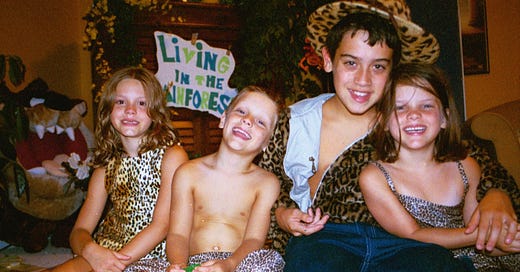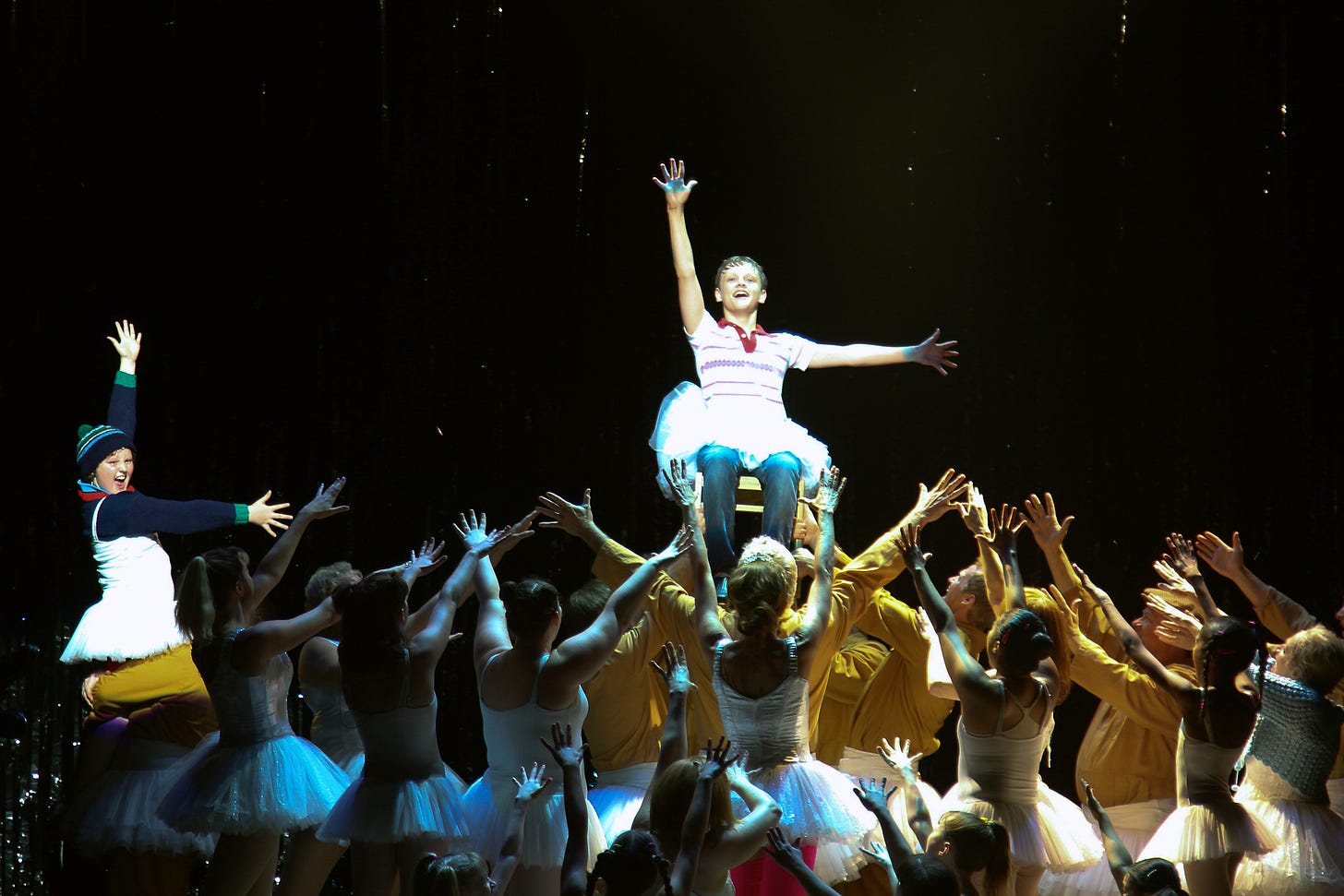Adventures of a Stage Dad
Parenting a child performer requires trust, flexibility and understanding
When our kids were growing up, eating together wasn’t dinner. It was dinner and a show.
That’s what happens when you have theatrical children in near-constant need of an audience. Sitting at that table watching them do their thing, trying to keep track of the overlapping dialogue, were some of the best times we had as parents.
Ben would perform stand-up comedy routines to avoid eating green beans. Emma would show off her latest tap steps. Kate would fire off a sly one-liner. When he was with us, Nick would try to direct the proceedings.
I’ve heard variations on this story from other parents and performers countless times, often accompanied by a befuddled, bemused, and sometimes bewildered, “I don’t know what to do with this.”
We didn’t either, at least initially. Now, thanks to years of experience, I can tell you this: Being the parent of a child actor comes with a learning curve that has the potential to throw your life into chaos at any point. If you’re not willing to endure the ebbs and flows that come with this new role, don’t take it. There is no sense in making yourself, your child, or other family members miserable.
That said, you won’t know if your child can do it unless you try.
Reality Checks
Between ages 9 and 18, Ben appeared in six shows in the D.C. area, three Broadway shows and went on two national tours. He lived in New York from 11 to 13, then was home in Virginia during his 10th grade year between the “Billy Elliot” and “Newsies” tours. After “Newsies,” he returned to New York at 18 for “Tuck Everlasting” and has remained there since.
Occasionally, through my work with Metropolitan School of the Arts, I get questions from others whose children are interested in pursuing a performing career. Usually, the parents want to know how to acquire an agent or manager, and what they should expect.
If they’re interested in nitty-gritty details, I often will point them to the Bizparentz Foundation, a California-based nonprofit that has advocated for child actors and their parents since 2004. The foundation has a wealth of information about child labor laws and regulations as well solid, common-sense advice for parents.
But if they want to just talk with a parent who has “been there,” I’ve developed several pieces of advice, some of which we knew going in and some I wish I had known. Over the next couple of essays, I’ll get into the other aspects of parenting a child actor.
First up, the “reality checks.”
Pursue this only if it is truly what your child wants and not what you want for your child. There is a huge difference.
As a parent, your job is to raise a person, not an actor. Let the professionals teach them to be good on stage, and you teach them to be good in life.
That said, helping your child navigate this path is a job too. Just because you have a manager and/or an agent, their success will not mean less work for you. If anything, it will mean more. They will not drive/fly/walk/train your child to an audition/callback/rehearsal/show. You are responsible for that.
“Entertainment” is first and foremost a business, especially if you’re in New York or Los Angeles. Your child may be pursuing this because they love to entertain, but the goal for the producers/production companies ultimately is profitability and sustainability. You could be working on the best project in the world today and be on the unemployment line tomorrow. Be prepared to prepare your child for that inevitability.
Training is a costly and necessary proposition. Kids who perform professionally are expected to be able to carry a tune, move, and act — at a minimum. Not being able to do so is to their disadvantage, and that becomes readily apparent the minute they walk into an audition. Start looking for people who can help you and be prepared to pay them. (Advantage: Training is a tax write off in most cases.)
Know that we each have our own path to follow in this life. As parents/ caregivers, it’s our job to encourage and help our kids find their own way and let them know they are loved no matter what happens.
Love your child and and cheer them on, whether they play customer number 10 in their elementary school play or the title role in “Annie” on Broadway. Applaud them for their achievements as a person, not just as an actor/actress/ performer.
Handling the ‘Chunks’
For stage parents, days and nights are broken into chunks, and show schedules can consume significant parts of your life. Professional guardians are hired by the show and assigned to the child when he/she is working. Parents and/or the child’s personal guardian are responsible for the rest — drop off, pick up, and the breaks in between.
How you handle the chunks is the difference between enjoying the experience and hating it. Everyone handles these things differently. I’ve seen parents who arrive for pick up five minutes early, make no eye contact with the other adults, scoop up the child, and drive away without saying goodbye. They are doing this out of parental obligation, not out of love for their child’s passion, and they seem to resent it. That’s a shame.
Others hang around outside and peer in the stage door whenever it opens, obviously pained their child is spending any time night or day without their supervision. They don’t understand why they are not allowed to watch rehearsals or be part of things backstage.
Again, this is a business, folks.
Understanding that fact is foreign, at least at first. Recognizing that your child, no matter how large or small, is in a work environment while in elementary or middle school does not seem to compute. At the same time, you have to trust that your child receives good care while in the company of other professionals. Knowing how and when it’s appropriate to step in and advocate is a judgment call.
If your child is fortunate enough to be in this position, let them concentrate and enjoy it without having to worry about your lurking presence.
Of course, diligently showing up five minutes early won’t hurt anyone’s feelings, especially late at night. Just don’t forget to say hello. Other parents appreciate it, even if they don’t say so…
In next week’s essay, we’ll get into some tips to help your son or daughter prepare for an audition.
If you have comments or questions, feel free to leave them below or send me an email.
The Daily Photos
Here are the Daily Photos posted for the week of March 28-April 3 to my Facebook business page. The photos represent the random things I capture during travels to various places.
If you’re on Facebook, you can check out the full-size images and more details about them there. If not, you can view my page by clicking on the link above. (You don’t have to be on Facebook to see my page.)
If you have any questions or are interested in purchasing a print, let me know in the comments or by sending an email.
See you next week!







This all has to be SO helpful for parents, Glenn! I was never a performing kid (at least, not in anyone's spotlight), nor have I ever been a parent (and only occasionally been apparent), but I followed my brother from Houston to LA in 1980.
He was a stand-up turned actor, and a couple things he told me he learned during his fame-chasing have helped me in whatever things I've done in my life since then: He went to EVERY audition, even, as he said, ones calling for elderly women, just to gain experience for the eventually (hopefully) big audition you really want!
The other tip he shared was "If they ask if you can ride a horse, say 'yes,' and then go learn in 5 minutes!" To all your readers, Glenn (and they'd better be legion), here's hoping they're not only listening, but taking notes!
Bravo! I sent you an email. You have a rare insight into what stage parents are, what they often turn out to be like, and what they really OUGHT to be and do. Looking forward to the next one!